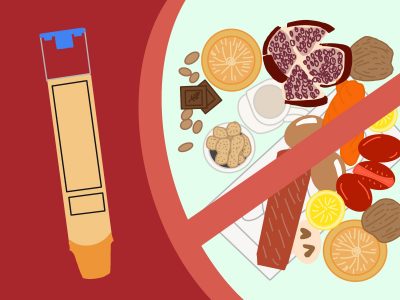I walked into a restaurant with my friends a couple weeks ago for a birthday event and anxiously expressed the following sentences toward my server, expecting she would understand my life-threatening situation.
“Does this meal contain any tree nuts?”
“Oh, a tree nut is pretty much any nut other than peanuts.”
“Can you please make sure the manager is aware of my allergy so there is no cross-contamination in the kitchen?”
Not only did it take time for me to relay information to the server, the manager and the chef, but my friends also had to be aware of my allergies so there would be no cross-contamination among our meals.
For people with allergies, the effects of not being able to consume certain foods extend beyond physical symptoms. It can pervade social settings, interpersonal relations and mental health, and — regardless of whether or not we have allergies — we should all be more cognizant of these effects.

A food allergy is an all too common condition. Around 8% of children under five and 4% of adults suffer from a food allergy, or multiple food allergies.
According to the Mayo Clinic, a “food allergy is an immune system reaction that occurs soon after eating a certain food.” This reaction can be moderate to severe — moderate being hives or digestive discomfort, and severe being anaphylaxis.
Anaphylaxis is a life-threatening condition that, when untreated, can cause coma or death soon after the allergic reaction begins. This is what happens to me if I eat pistachios, and this is why it is important for you to ask your friends and family about their allergies and what you can do to help make their environment as safe as possible.
There is a difference between a food allergy and an optional dietary restriction. Optional dietary restrictions — while we should respect them — are often a personal choice, and do not lead to death by a severe immune system reaction.
People who have food allergies face the daily fear of being around food which they are unfamiliar with. Both dietary restrictions and food allergies should be held at equal importance when restaurants create menus and when others hear about someone’s personal diet preference.
There can be a lot of anxiety and shame about one’s food allergy. Some of this shame can come from “allergy bullying” — a phenomenon where people are shamed or deliberately pranked because of their allergies. Not only is this extremely sad and mentally destructive, but food allergy bullying can be physically destructive as well.
In an article published by Teen Vogue, Elena Bailoni discusses how even allergy jokes can provoke emotional distress. “Kids don’t always understand the serious consequences of using food as a weapon,” she writes. “It’s so easy to jump to the conclusion that someone has requested a gluten- or dairy-free menu for attention.”
Unfortunately, the problem is widespread. One-third of children with food allergies report facing bullying at school because of being unable to eat certain foods.
Felicia Sabartinelli, a writer from Western Colorado, writes about how her life has been “plagued with food allergies” for 15 years. She expresses, “My food allergies always feel like an inconvenience to those around me.”
The mental toll of having allergies hasn’t just affected these two women, however. A survey by Food Allergy Research & Education revealed that two-thirds of its respondents had mental health concerns related to their allergies.
It is obvious the mental and psychosocial effects of allergies are just as pervasive as the physical symptoms. In both cases, people with allergies require the support of their community to overcome these obstacles.
No person should feel like an annoyance or a complication because of an immune reaction they cannot control. Those of us with food allergies want to participate at birthday parties, a first date in a new restaurant, and trips to locations where new foods and new cultures emerge from the most beautiful places. We just need to take extra precautions — and we need you to defend and accommodate those precautions when you are with us.
























































































































Nona • Feb 11, 2022 at 10:10 am
Having dealt with your allergies all your life and your Aunts I am well aware of the concerns you have and those of the millions of people with allergies. I hope I have always accommodated my families concerns and those of others with allergies.
Very nicely written, informative and a wonderful reminder we should share in the care of those with differences in our lives
Holly • Feb 11, 2022 at 9:55 am
This is so good!